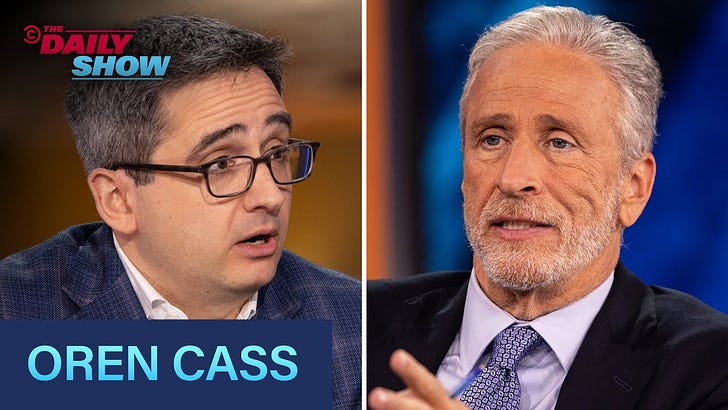Last night, I had the chance to join Jon Stewart on The Daily Show to explain the New Right’s approach to economics and what comes after globalization. We were supposed to talk for ten minutes, went for 30, and then they ran the whole thing. So I guess it was interesting, or else my answers were so rambling and inscrutable that they couldn’t figure out where to cut. You be the judge:
Some highlights (emphasis added):
OREN: And so conservatives have been seeing, especially over the last decade, a lot of the things we care about, things everybody cares about, do jobs pay enough to support a family?
JON: Right.
OREN: Are we too dependent on China for everything? Can we make computer chips in this country? Markets were perfectly happy to give us really bad answers on those questions, and so conservatives are starting to say, “Well, wait a minute. We actually have to care about this, and we have to be prepared to do something about it.”
—
OREN: If you go back in the history of conservatism, even if you look at Ronald Reagan himself, Reagan was a trade protectionist, he basically started a trade war with Japan because he did care about these things.
JON: Right. This was in the days of Japanese carmakers were making cars that were cheaper, people were preferring them, they were dominating the market in America.
OREN: That’s right. And Reagan negotiated an outright quota that Japan, not even a tariff, Japan will not increase the number of cars it sends into America. And that’s why we now have the American auto industry in the South. Honda and Toyota make American cars essentially, because somebody like Reagan was willing to recognize trade is good if it's fair and balanced, but we’re not going to be dogmatic.
—
JON: In some respects though, we regard... I think we’re putting a certain motive on China, when in fact, these were corporations seeking the lowest water of wages, and what they get paid people, and certainly labor can't travel the way that capital does. I guess the idea is we levy these tariffs, and then these corporations that had been seeking this will all go, “Oh, okay, it's not worth our while anymore.” And they'll reinvest in the States. Is that kind of the broad theory of it?
OREN: Yes. The idea is that corporations are going to respond to incentives, and you go all the way back to Adam Smith and the Wealth of Nations, and the idea of capitalism, you want people pursuing profit to do that in a way that is also good for the society. Where I think a lot of economists, and this is left and right of center got it wrong was to think that's just always the case. As long as they're pursuing profit, it's going to be good. And it’s only going to be good if it's within certain constraints. If the things that are most profitable actually are things that are good for the country.
JON: And the government decides what those constraints are, so they put guardrails around them. I guess the question I have is, tariffs feel somewhat, I don't want to say whimsical in the sense of, “Oh, he dances downstairs in a tutu and says, ‘25% on whiskey.’” But they are executive actions, and if you are a business making a... I assume their plans are five-year, 10-year, 20-year, if they could just be repealed by the next guy, and it's not legislation, is that really an effective incentive for bringing back all that manufacturing?
OREN: I think that's a very fair concern, and ideally, it would be done through legislation. I think one of the things that’s very encouraging is to see that we are increasingly now seeing a new bipartisan consensus that we do want to change this.
—
OREN: The alliance is premised on, if you are Germany, you are on the front lines of what the concerns in Europe are. If you are Japan, you are on the front lines of the concerns with China.
JON: Right.
OREN: It’s not a matter of everyone simply turning and asking the U.S. what the U.S. is going to do. And then the third element is keeping China out, and recognizing that China... To your point, China's just been doing China, doing what's best for China, but that is not consistent with what the U.S. and a U.S.-led alliance would want. And so if you want to get from where we are today to that kind of system, you are asking things of allies that they haven't been asked before.
JON: Right.
OREN: And so the question is, how do you make that a credible ask? Because I think it’s fair, I don't think that those are unreasonable things to ask, but you are going to have to be willing to back that up and say, “The old version is gone. Let's talk about what the new version could look like.”
— Oren





Truly insightful discussion. But Mr. Cass, there remains an elephant in the room : do you REALLY believe that the current president actually believes - let alone understands - all the concepts you meticulously explained? A president who peddled golden sneakers, crypto and NFTs and who surrounded himself with “qualified” yes men? Sorry, but I’ll believe your vision of the New Right when Republicans get a new leader.
This was a great interview and the reason I am now following you on Substack.